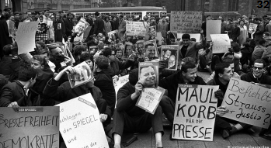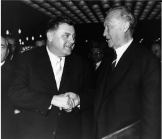Photo AI
Last Updated Sep 26, 2025
Adenauer’s decline and the Der Spiegel Crisis of 1962 Simplified Revision Notes for A-Level Edexcel History
Revision notes with simplified explanations to understand Adenauer’s decline and the Der Spiegel Crisis of 1962 quickly and effectively.
405+ students studying
Adenauer's decline and the Der Spiegel Crisis of 1962
Both in the 1953 and 1957 federal elections, Adenauer's chancellorship was unchallenged. In 1957, the man truly responsible for West Germany's economic miracle, Ludwig Erhard, served as vice chancellor. Following FRG's membership in the EEC, tensions developed between Erhard and Adenauer. Erhard believed that the EEC should be oriented toward the political and economic unification of countries in Western Europe, rather than be limited to its original six members. The antagonism led to the removal of Erhard as successor of Adenauer in 1959.
Often regarded as the George Washington of West Germany, Adenauer's executive power generally limited the growth of the Bundestag. During his 12 years of chancellorship, all general and detailed policies were decided by him.
On 17 April 1959, Adenauer announced his interest in running for president of the republic, which was received favourably. However, when the majority of the Bundestag decided to replace him with Erhard over Franz Etzel (Adenauer's personal choice), he renounced his first decision and reconsidered retaining his position as chancellor. As a result, many colleagues viewed him disrespectful of democratic procedures.
On 26 October 1962, the Spiegel affair erupted after the arrest of five Der Spiegel journalists and two editors-in-chief. Called by Chancellor Adenauer an "abyss of treason", the weekly magazine was charged with espionage for publishing an article detailing the weaknesses of the West German armed forces. It was later known as the Spiegel memo. Although Adenauer did not order the arrest, he initially defended the man behind it, Defence Minister Strauss. Since the scandal was the first post-war governmental act against the press, the West German public and both domestic and international media criticised the FRG.
The memo included an assessment by a NATO's commander regarding the unreadiness of the West German forces to defend the FRG and its citizens from a nuclear strike by the Warsaw Pact.

Image showing the reaction to the Spiegel affair
Through search and arrest warrants signed by a federal judge, the federal crime office searched the Spiegel headquarters. After the arrests of several journalists, the authorities failed to capture Rudolf Augstein, the Spiegel's publisher. Meanwhile, Conrad Ahlers, author of the article, was arrested by Spain.
On the same day of publication, Strauss reported that the Spiegel memo revealed about 41 state secrets, which was chargeable with high treason. In response, members of the press rallied outside the Spiegel. They accused the Adenauer government of neglecting freedom of the press and the rule of law.
Soon, the details of the Spiegel affair emerged. It identified Adenauer's coalition government, the CDU-CSU-FDP ordered the action against the magazine's staff. The coalition began to collapse.
On 14 December 1962, Adenauer called for a new cabinet - without Strauss, to renew the coalition. By the autumn of 1963, he announced his resignation as chancellor of the FRG.
Those who were arrested were detained for more than 100 days. In the end, none were convicted of treason.
Following the Spiegel affair, Strauss was forced to resign as defence minister. In 1980, he was selected by the CSU-CDU as a candidate for chancellor, but did not win. Many regarded the affair as one of the main causes of his defeat.

Strauss and Adenauer in 1961
With 279 votes against 180 votes, Erhard succeeded Adenauer as chancellor of the FRG on 16 October 1963.
500K+ Students Use These Powerful Tools to Master Adenauer’s decline and the Der Spiegel Crisis of 1962 For their A-Level Exams.
Enhance your understanding with flashcards, quizzes, and exams—designed to help you grasp key concepts, reinforce learning, and master any topic with confidence!
440 flashcards
Flashcards on Adenauer’s decline and the Der Spiegel Crisis of 1962
Revise key concepts with interactive flashcards.
Try History Flashcards32 quizzes
Quizzes on Adenauer’s decline and the Der Spiegel Crisis of 1962
Test your knowledge with fun and engaging quizzes.
Try History Quizzes29 questions
Exam questions on Adenauer’s decline and the Der Spiegel Crisis of 1962
Boost your confidence with real exam questions.
Try History Questions27 exams created
Exam Builder on Adenauer’s decline and the Der Spiegel Crisis of 1962
Create custom exams across topics for better practice!
Try History exam builder120 papers
Past Papers on Adenauer’s decline and the Der Spiegel Crisis of 1962
Practice past papers to reinforce exam experience.
Try History Past PapersOther Revision Notes related to Adenauer’s decline and the Der Spiegel Crisis of 1962 you should explore
Discover More Revision Notes Related to Adenauer’s decline and the Der Spiegel Crisis of 1962 to Deepen Your Understanding and Improve Your Mastery
96%
114 rated
Divided GermanyThe Federal Republic the DDR1949-63
The creation of West Germany and the DDR
389+ studying
194KViews96%
114 rated
Divided GermanyThe Federal Republic the DDR1949-63
The Basic Law of West Germany
366+ studying
188KViews96%
114 rated
Divided GermanyThe Federal Republic the DDR1949-63
The 1949 election; the economic miracle
211+ studying
190KViews96%
114 rated
Divided GermanyThe Federal Republic the DDR1949-63
FRG elections of 1953, 1957 and 1961
367+ studying
196KViews